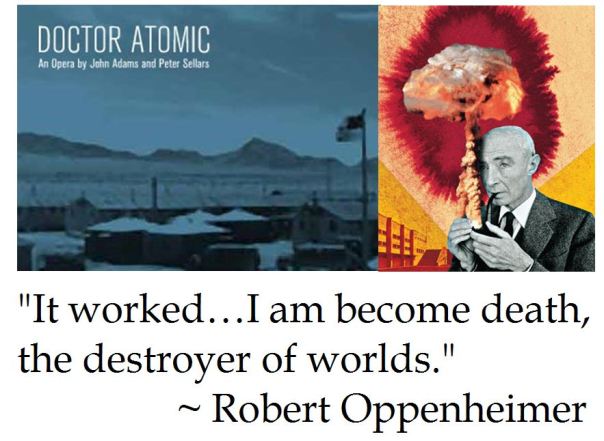
Robert Oppenheimer, the American theoretical physicist from the University of California at Berkeley, headed the Manhattan Project since 1942 thus he was dubbed "the Father of the Nuclear Bomb" or Doctor Atomic.
The Manhattan project moved from New York City to Los Alamos, New Mexico in order to maintain great secrecy for the American World War II effort. Eventually, the remote, desert like compound grew to more than 6,000 people.
No one was sure what would happen when testing "the bomb". Some worried that the detonation would light off the atmosphere. But on July 16th, 1945, the Manhattan Project achieved a success with the detonation of the first nuclear bomb near Alamagordo, New Mexico (code named "Trinity")
When reflecting upon the successful explosion of the Trinity bomb, Oppenheimer mused that he thought of a Hindu verse from the Bhagavad Gita: "Now I become death, the destroyer of worlds." Oppenheimer may have internally mused that verse, but Oppenheimer's brother was an eyewitness to Doctor Atomic's reaction, and all he said was "It worked." Brigadier General Thomas Farrell was also an eyewitness to Oppenheimer's reaction in the Trinity control bunker, and Farrell observed:
Dr. Oppenheimer, on whom had rested a very heavy burden, grew tenser as the last seconds ticked off. He scarcely breathed. He held on to a post to steady himself. For the last few seconds, he stared directly ahead and then when the announcer shouted "Now!" and there came this tremendous burst of light followed shortly thereafter by the deep growling roar of the explosion, his face relaxed into an expression of tremendous relief.This was the only bomb that the Manhattan Project possessed. However, within three weeks, two atomic bombs were ready for use in the Pacific theater to try to obtain unconditional surrender from the Japanese.
In 2005, composer John Adams premiered an opera "Doctor Atomic" with the San Francisco Opera in which much of the libretto was based on declassified American government documents about the Manhattan Project.

No comments:
Post a Comment